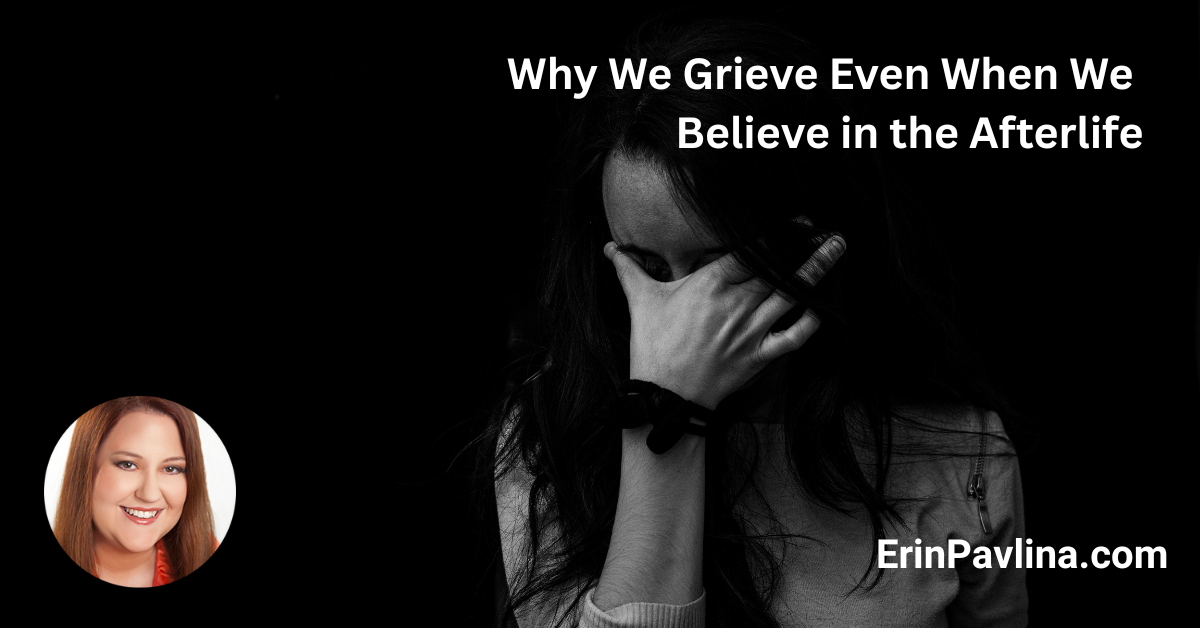If you believe in the afterlife, you may have asked yourself—or been asked—this question: “If you know your loved one is in a better place, why are you grieving?” It’s a fair question, and one that touches the very heart of what it means to be human.
Spiritual belief can bring comfort, but it doesn’t cancel out the emotional pain of loss. Grief is not a sign that we lack faith. In fact, it often deepens because of how deeply we love. Here’s why even the most spiritually aware people still experience grief when someone they love dies.
Love Doesn’t End at Death
Believing in the afterlife often means we trust that the soul continues on, evolving or resting in peace. But that doesn’t erase the bond we had with them in this life—the conversations, the shared meals, the laughter, and even the arguments. When someone dies, what we grieve is the physical absence, the daily presence that is now missing.
We don’t get to hug them. We can’t call them when something amazing—or awful—happens. Their voice goes silent. That space they occupied in our physical world becomes achingly empty.
Grief is love with nowhere to go. And even when we know they’re alive in spirit, we still long for their human presence. That longing is natural. It’s healthy. It’s deeply human.
Spiritual Knowing Doesn’t Cancel Emotional Pain
Think of it like this: imagine someone you love moves to another country. You might be happy for their opportunity, and you may even be able to talk to them regularly, but you’ll still miss being with them in person. You might cry when they leave. You’re not crying because you think they’re suffering—you’re crying because you’re experiencing the separation.
Similarly, believing in the afterlife doesn’t mean we won’t feel emotional pain. It just gives us a broader context for it. The pain of separation is still real. Grieving doesn’t mean you’re doubting the afterlife. It means your heart is adjusting to life without their physical form.
Grief Is a Sacred Process
From a spiritual perspective, grief is not just a reaction—it’s a rite of passage. It honors the depth of your love, the richness of your connection, and the sacred transition your loved one has made.
In some cultures, mourning is not only accepted but expected, even when there’s a strong belief in the afterlife. People wear black, sit in mourning, sing songs of remembrance, and hold vigils. These rituals don’t diminish faith—they amplify it. They help bridge the space between worlds.
Allowing yourself to grieve honors the human experience, and allows your spirit to slowly adjust to a new kind of relationship—one that is no longer physical, but still very real.
You’re Not Just Grieving for Them—You’re Grieving for You
Even when we know someone is at peace or reunited with loved ones on the other side, we are still left to carry on without them. We’re the ones navigating holidays, birthdays, and quiet mornings without their energy in our space. Grief is as much about what we’ve lost as it is about where they’ve gone.
It’s also normal to grieve lost potential—conversations you’ll never get to have, milestones they’ll never witness, and dreams that will remain unshared. This pain is valid. And spiritual belief doesn’t erase it—it just offers us a light in the darkness.
Grief and Faith Can Coexist
You can cry for someone and still feel their presence in spirit.
You can feel devastated and still believe they’re in a place of love and healing.
You can feel the emptiness of their absence and still talk to them, sensing their subtle guidance.
Grief and belief are not enemies. They are companions. One honors the depth of your love; the other offers hope beyond the pain.
A New Relationship Begins
Eventually, for many who are spiritually open, a new kind of connection starts to form. You might sense your loved one in dreams, feel them around you during significant moments, or receive signs that they’re still nearby.
Grieving allows space for that transition. You’re not “letting go” of them—you’re letting go of how they were, to embrace what they are now. The relationship continues. It just transforms.
Final Thoughts
Believing in the afterlife can give us tremendous comfort—but it doesn’t make us immune to grief. In fact, our grief may be a testament to how much we loved, how deeply we connected, and how human we truly are.
So if you find yourself grieving despite your faith in the afterlife, know that this is normal. You are not weak in your beliefs—you are simply honoring the sacred, human experience of love and loss.
Let yourself feel it all. Cry if you need to. Talk to them if you want to. And trust that grief is not the end of your story with them—it’s the beginning of a new chapter, one that bridges worlds, and deepens your connection to both love and spirit.
You will see your loved ones again.


